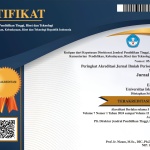Regulation of Electronic Notarial Deed Creation in Indonesia Based on the Principle of Legal Certainty: Between Opportunities and Challenges
Abstract
Keywords
References
Journals:
Abdillah, Satrio & Hamanda Hadi Saputra. (2025). Urgensi Regulasi Cyber Notary Dalam Mendukung Kepastian Hukum di Era Digital. Lex Stricta: Jurnal Ilmu Hukum: Vol. 4 No. 1 p. 1-12, DOI: https://doi.org/10.46839/lexstricta.v4i1.1367, https://ojs.stihpada.ac.id/index.php/lexstricta/article/view/1367.
Aborujilah, Abdulaziz, Muhammad Naqib Bin Mohd Yatim, Abdulaleem Al-Othmani. (2021). Blockchain-Based Adoption Framework for Authentic Land Registry System in Malaysia. TELKOMNIKA (Telecommunication Computing Electronics and Control): Vol. 19 No. 6: p. 2038-2049. DOI: https://doi.org/10.12928/telkomnika.v19i6.19276, https://www.telkomnika.uad.ac.id/index.php/TELKOMNIKA/article/view/19276
Aggarwal, Shubhani et al. (2019). Blockchain for Smart Communities: Applications, Challenges and Opportunities. Journal of network and computer applications: Vol. 144: p. 13-48. DOI: https://doi.org/10.1016/j.jnca.2019.06.018, https://www.sciencedirect.com/science/article/abs/pii/S1084804519302231.
Al-Jaroodi, Jameela & Nader Mohamed. (2019). Blockchain In Industries: A Survey. IEEE access: Vol. 7: p. 36500-36515, DOI: 10.1109/ACCESS.2019.2903554, https://ieeexplore.ieee.org/abstract/document/8662573.
Asri, Ida Ayu Putu Purnam & Wyasa Putra Ida Bagus. (2025). Penerapan Blockchain Dalam Pengembangan Smart Contract di Indonesia. Acta Comitas: Jurnal Hukum Kenotariatan: Vol. 10 No. 02: 316-331, DOI: https://doi.org/10.24843/AC.2025.v10.i02.p7, https://ejournal4.unud.ac.id/index.php/acta/id/article/view/2.
Dalem, Anak Agung Gede Kresna & I Made Sarjana. (2025). Pembuktian Akta Perjanjian Yang Terdapat Substansi Nominee Berkaitan Dengan Penguasaan Hak Milik. Acta Comitas: Jurnal Hukum Kenotariatan: Vol. 10 No. 02: p. 305-315, DOI: https://doi.org/10.24843/AC.2025.v10.i02.p6, https://ejournal4.unud.ac.id/index.php/acta/id/article/view/13.
Dhinata, I Kadek Mahardika Rangga & I Made Walesa Putra. (2025). Autensitas Akta PPAT Sebagai Alat Bukti Sempurna Dalam Mencapai Vis-Probandi Dari Perspektif Asas Kesesuaian. Acta Comitas: Jurnal Hukum Kenotariatan: Vol. 10 No. 02: p. 399-418, DOI: https://doi.org/10.24843/AC.2025.v10.i02.p12, https://ejournal4.unud.ac.id/index.php/acta/id/article/view/11.
Lubis, Ikhsan, et al. (2022). Comparison Of Civil Law Regarding the Implementation of Cyber Notary in Countries with Common Law and Civil Law Traditions. Jurnal IUS Kajian Hukum Dan Keadilan: Vol. 10 No. 1: p. 1-11. DOI: https://doi.org/10.29303/ius.v10i1.981, https://www.jurnalius.ac.id/ojs/index.php/jurnalIUS/article/view/981.
Lubis, Ikhsan et al. (2024). Exploring the Potential of the Cyber Notary Concept in the Framework of International Transaction Settlement. Acta Law Journal: Vol. 3 No. 1: p. 1-13. DOI: https://doi.org/10.32734/alj.v3i1.18891.
Mayana, Ranti Fauza & Tisni Santika. (2021). Legalitas tanda tangan elektronik: posibilitas dan tantangan notary digitalization di Indonesia. ACTA DIURNAL Jurnal Ilmu Hukum Kenotariatan: Vol. 4 No. 2: p. 244-262, https://jurnal.fh.unpad.ac.id/index.php/acta/article/view/517.
McGhin, Thomas et al. (2019). Blockchain in Healthcare Applications: Research Challenges and Opportunities. Journal of Network and Computer Applications: Vol. 135 No. January: p. 62–75, https://doi.org/10.1016/j.jnca.2019.02.027, https://www.sciencedirect.com/science/article/abs/pii/S1084804519300864.
Merlyani, Dwi. Annalisa Yahanan, Agus Trisaka. (2020). Kewajiban Pembacaan Akta Otentik Oleh Notaris Dihadapan Penghadap dengan Konsep Cyber Notary. Repertorium: Jurnal Ilmiah Hukum Kenotariatan: Vol 9 No. 1: p. 36-47, DOI: https://doi.org/10.28946/rpt.v9i1.358, https://journal.fh.unsri.ac.id/index.php/repertorium/article/view/358.
Namasudra, Suyel et al. (2021). The revolution of blockchain: State-of-the-art and research challenges. Archives of computational methods in engineering: Vol. 28 No. 3.: p. 1-19, DOI: https://doi.org/10.1007/s11831-020-09426-0, https://www.researchgate.net/profile/Suyel-Namasudra/publication/341254169_The_Revolution_of_Blockchain_State-of-the-Art_and_Research_Challenges/links/62d8521325155478d53fd92c/The-Revolution-of-Blockchain-State-of-the-Art-and-Research-Challenges.pdf.
Nisa, Naily Zahrotun. (2020). Aspek Legalitas Penyimpanan Minuta Akta Notaris Secara Elektronik. Jurnal Civic Hukum: Vol. 5 No. 2: p. 205-219, DOI: https://doi.org/10.22219/jch.v5i2.13909, https://ejournal.umm.ac.id/index.php/jurnalcivichukum/article/view/13909.
Nurunnisa, Nadya & Endang Prasetyawati. (2024). Tanggung Jawab Notaris Dalam Pembuatan Akta Secara Elektronik. Seminar Nasional: Mewujudkan Sistem Hukum Nasional Berbasis Pancasila (Surabaya), Fakultas Hukum Universitas 17 Agustus 1945 Surabaya, January 22, 2024, https://conference.untag-sby.ac.id/index.php/shnbc.
Radbruch, Gustav. (1946). Statutory Lawlessness and Supra-Statutory Law (1946)." Oxford Journal of Legal Studies: Vol. 26 No. 1: p. 1-11, DOI: https://doi.org/10.1093/ojls/gqi041, https://philpapers.org/rec/GUSSLA-2.
Books:
Adjie, Habib. (2021). Sanksi Perdata Dan Adminstratif Terhadap Notaris Sebagai Pejabat Publik. Bandung: Refika Aditama.
Atmadja, I Dewa Gede & I Nyoman Putu Budiartha. (2024). Dasar-Dasar Hermenutika Hukum. Depok: PT RajaGrafindo Persada.
Atmadja, I Dewa Gede et al. (2024). Penalaran Hukum dan Pendapat Hukum Legal Reasoning and Legal Opinion. Depok: Rajawali Pers.
Bachrudin. (2020). Hukum Kenotariatan. Yogyakarta: Thema Publishing.
Dewanto, Mukti Fajar Nur & Yulianto Achmad. (2010). Dualisme Penelitian Hukum Normatif dan Empiris. Yogyakarta: Pustaka Pelajar.
Ibrahim, Johnny. (2012). Teori dan Metode Penelitian Hukum Normatif. Malang: Bayumedia.
Marzuki, Peter Mahmud. (2011). Penelitian Hukum. Jakarta: Kencana Prenada Media Group.
Mertokusumo, Sudikno. (2014). Teori Hukum (Edisi Revisi). Yogyakarta: Cahaya Atma Pustaka.
Soekanto, Soerjono & Sri Mamudji. Penelitian Hukum Normatif Suatu Tinjauan Singkat. Jakarta: RajaGrafindo Persada.
Regulations:
Indonesian Civil Code.
Law Number 30 of 2004 concerning the Position of Notary.
Law Number 11 of 2008 concerning Electronic Information and Transactions.
Law Number 2 of 2014 concerning the Amendment to Law Number 30 of 2004 concerning the Position of Notary.
Law Number 19 of 2016 concerning the Amendment to Law Number 11 of 2008 concerning Electronic Information and Transactions.
Law Number 27 of 2022 concerning Personal Data Protection.
Law Number 1 of 2024 concerning the Second Amendment to Law Number 11 of 2008 concerning Electronic Information and Transactions.
Government Regulation Number 71 of 2019 concerning the Implementation of Electronic Systems and Transactions.
Internet:
Mochamad Januar. “Mengukur Besar Pengaruh Indeks EoDB Terhadap Reformasi Regulasi Indonesia”. https://www.hukumonline.com/berita/a/mengukur-besar-pengaruh-indeks-eodb-terhadap-reformasi-regulasi-indonesia-lt6214b4096458a/, accessed on 30 September 2025.
Others:
Amelia, Lydia. (2025). Rekonstruksi Regulasi Keabsahan Penyimpanan Minuta Akta Notaris Secara Elektronik Berdasarkan Nilai Keadilan. Disertasi. Semarang: Universitas Islam Sultan Agung.
DOI: https://dx.doi.org/10.30659/jdh.v8i3.48603
Refbacks
- There are currently no refbacks.
View My Stats

This work is licensed under a Creative Commons Attribution 4.0 International License.
Jurnal Daulat Hukum has been indexed in:

